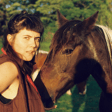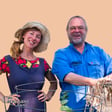
Writing, Ice + Arctic Foxes with Robyn Mundy
An interview with the intrepid author of my favourite book in recent years, Robyn Mundy!
(Word nerds, snow bunnies, penguin enthusiasts and fans of the freezing cold, this one’s for you.)
Robyn is a Tasmanian author and adventurer, Arctic guide, Antarctic research assistant, and lifelong lover of snow and ice.
I picked up her book Cold Coast in the library on a whim, because it had a cute Arctic fox on the cover and came recommended by library staff.
It tells the true story of Vanny Voldstad, the first female trapper in Svalbard, who defied 1930s gender norms to claim her place in the perilous and male dominated world of polar bear and fox hunting.
Robyn’s sensitivity, intelligence, and reverence for wild nature shines on the page — and I suspected she’d be a wealth of Reskillient wisdom. (Correct.)
Even if you haven’t heard of Robyn or read her books, there are so many gems in this conversation — strong rewilding themes, advice for aspiring storytellers and the unmistakable call to adventure that might just have you booking a ticket on the next ship to Antarctica.
Robyn Mundy ~ The Nature of Ice
Favel Parret ~ Past the Shallows
Sound credit: klankbeeld on Freesound.org
***Join the not-culty-at-all Reskillience community on Patreon***



















